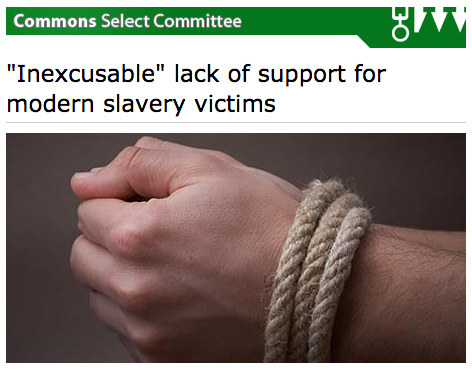'Insufficient support for human trafficking victims'
Urgent reform is needed as lack of support is leaving human trafficking victims destitute and their traffickers unpunished, MPs' report warns
 The findings emerged from a recent Work and Pensions Committee inquiry. The inquiry focused on what support is available to victims after the initial 45 day ‘reflection and recovery’ period that a victim of human trafficking spends in a safe house while their case is being considered.
The findings emerged from a recent Work and Pensions Committee inquiry. The inquiry focused on what support is available to victims after the initial 45 day ‘reflection and recovery’ period that a victim of human trafficking spends in a safe house while their case is being considered.
Once this period is elapsed the victim must move out of the safe house and are not guaranteed any further help or assistance.
MPs on the committee heard from many victims who had faced extreme difficulties in accessing benefits and housing after leaving the safe house with some left homeless, destitute and afraid. Without access to these basic entitlements, victims were left at severe risk of being re-trafficked.
This led to the MPs describing ‘inexcusable’ failures in the system. The inquiry recommended 12 months of support for victims of human trafficking.
It is estimated that there are 10,000 – 13,000 slaves in the UK.
The charity Christian Action Research and Education (CARE) was among those who gave evidence to the Department of Work and Pension’s Committee.
Its Senior Policy Officer for Human Trafficking, Louise Gleich, said the charity calls upon the next government to take action on this issue.
She added, 'It’s clear that current support for individuals recognised as human trafficking victims is inadequate and therefore in urgent need of reform.
'The committee have recognised serious barriers which stop human trafficking victims from being able to access the support they are not only entitled to, but severely need so that they do not end up destitute and homeless.
'Benefits such as money for food and housing benefits restore dignity to trafficking victims, help them feel safe and are essential for them to live their day-to-day lives. Failure to make these change put victims in great danger of being re-trafficked.
'The special circumstances of human trafficking victims need to be recognised in the system and allowances made; all frontline staff at council offices and job centres need to be trained in how to respond to the needs of human trafficking victims and support them through the complexity of the benefits process.
'CARE’s end goal is that we want victims of human trafficking to be able to integrate into society and lead fulfilling lives, but this can only happen if we make it easy for victims to get the support and help that they need.'
Baptist Times, 08/05/2017